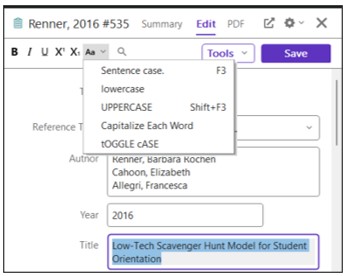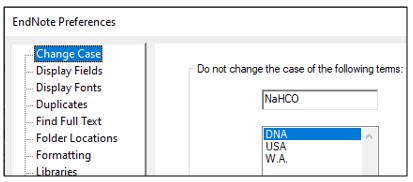EndNote essentials
EndNote can format your in-text citations and reference list in a selected referencing style. When you download EndNote, it includes hundreds of referencing styles, including Curtin-specific styles for APA, Chicago Author-Date, and Vancouver.
Important note
EndNote will format your references based on the style you select. However, it does not recognise if any information is incorrect or missing. It is strongly recommended that you learn the rules of your referencing style and check your citations and reference list entries against the referencing guide or style manual. This will help you make sure your references are accurate and consistent.
Select a style
- Highlight a reference in your library and click the arrow to expand the Preview panel under the Summary tab
- Click the Bibliographic Output Style box. The default style will be Annotated. A short list of styles will appear
- To find more styles, click Select Another Style… from the menu
- A Choose A Style box will open with a longer list of referencing styles
- Type the name of the style you need into the Quick Search box and press Enter
- Highlight the style you want to use, then click Choose
- Your reference will now appear in the style you selected.
Once you have chosen a style from the expanded list, it will be added to the Bibliographic Output Style drop-down menu for easy access.
Curtin EndNote styles
Curtin provides custom EndNote styles that match our referencing guides for APA 7th, Chicago 17th Author-Date, Chicago 18th Author-Date and Vancouver. These styles are usually included in the Select A Style menu in EndNote. If they do not appear, you can download the files:
Windows:
- Click on the style file to download it
- Select Open or Download (depending on the browser you are using). The style will open in EndNote
- Go to File and Save As, remove the word “Copy” and click Save
- Close the style file. It will now appear in your Select Another Style menu.
Mac:
- Click on the style file style and locate it in your Downloads folder
- Drag the style file into your Styles folder: Applications > EndNote > Styles
- It will now appear in your Select Another Style menu.
Abbreviate journal names (Vancouver)
Some referencing styles, such as Vancouver, require journal names to be written in abbreviated form. For example, New England Journal of Medicine becomes N Engl J Med. EndNote allows you to import a terms list so that journal names are automatically abbreviated.
- Click on the Library menu, then select Open Term Lists and choose Journals Term List
- If there are already journal names listed under the Terms tab, highlight them and click Delete Term
- Click on the Lists tab, highlight Journals, and then click Import List…
- A folder called Terms List should open automatically. If it does not, go to: Windows: C:\Program Files (x86)\EndNote 2025\Terms Lists or Mac: Applications\EndNote 2025\Terms
- If you are using the Vancouver style, select the file named Medical.txt, then click Open. The list of journal abbreviations will be added
- Close the Terms List window
- Go to the Tools menu, select Output Styles, and click Edit “Vancouver Curtin”
- In the style editor, click on Journal Names and make sure the following options are selected: Abbreviation 2 and Abbreviate journal articles only
- Click File, then select Save As. Give the style a new name, such as Vancouver Curtin abbreviated.
- Click Save. This new style will now appear in your Select Another Style menu.
Preview and edit references
It is important to preview your references to make sure they are correctly formatted in the referencing style you have selected.
- Select the reference in your library, then click the arrow to open the Preview panel under the Summary tab
- To make changes, click on the Edit tab in the Tabs panel
- Click into the field you want to update and enter the correct information
- Click Save.
Change case
Some reference styles, like APA, show the title exactly as it is entered in EndNote. If the title has the wrong capitalisation, you need to fix it to match the style rules. A quick way to do this is:

- Highlight the title in the reference
- Select the Change Case dropdown menu (Aa button) at the top of the Edit tab
- Click on the correct option (for example, Sentence case)
- Then click Save in the record.
Note: EndNote cannot tell if words are proper names and should be capitalised. You may need to fix these manually.
Change capitalisation for acronyms, abbreviations, etc.
Some referencing styles (for example, Chicago Author-Date) may change the capitalisation in titles. This can affect how acronyms, abbreviations or formulas display. For example, DNA may appear as dna or Dna. To fix this:

- Select the Edit menu (Windows) or EndNote (Mac) and click on Preferences
- Select Change Case
- Type the term with correct capitalisation (e.g. DNA) and click Add
- Click Apply and OK.